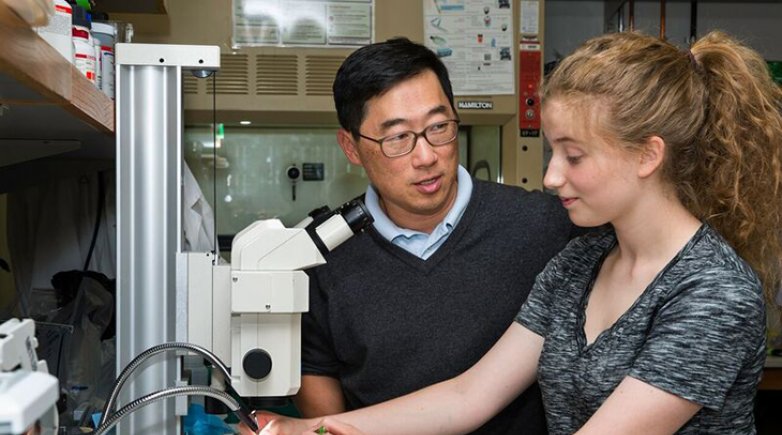PEA students and faculty collaborate on genetics research with Stanford University lab
PEA announces the publication of a peer-reviewed research paper in G3: Genes, Genomes, Genetics, a journal of the Genetics Society of America. The result of a collaboration between a Stanford University research lab and Exeter’s Science Department, the article’s authors include researchers from Stanford, two Academy science instructors, a PEA lab manager, and 24 recent graduates — who were students in an advanced biology course when they began their research in the classroom at Exeter.
The paper, which outlines the students’ work in genetically modifying and breeding new sets of Drosophila fruit flies, could have broad implications in the study of developmental biology and medicine — particularly in the treatment of diabetes. While it is unusual for this peer-reviewed scientific journal to publish a paper co-authored by high school students, reviewers of the manuscript (”A Drosophila LexA Enhancer-Trap Resource for Developmental Biology and Neuroendocrine Research”) have stated that the students’ research will provide "a valuable experimental resource" to the scientific community, facilitating the study of ”diverse biological questions.”
Dr. Seung K. Kim, who is one of the primary Stanford researchers, notes that ”the novel collection of fruit fly lines produced by these students has already advanced work by members of my lab on identifying factors that regulate insulin output, a major focus of my Stanford diabetes research group.” Kim, who graduated from Exeter in 1981, is a member of the Department of Developmental Biology and the Department of Medicine (Oncology Division) at Stanford University School of Medicine. He studies pancreas developmental biology and cancer biology. He and his colleague and co-author Dr. Lutz Kockel have been working closely with Exeter students for several years.
Interested in giving young people the opportunity to engage in authentic scientific inquiry and discovery, Kim has since 2012 invited students and teachers from his alma mater to join him for a summer internship in his lab at Stanford. They take their knowledge back with them to the classroom at Exeter, where students in an advanced biology course, designed by Kim and Exeter science instructors Townley Chisholm and Anne Rankin, have the chance to play a direct role in his work.
Kim says the publication of the students’ findings in a peer-reviewed journal should be viewed as a ”natural outcome of serious engagement in science” and marks a major milestone in the four-year trajectory of the course. ”I’m delighted that we were able to take the students’ materials and data and put it together in a constructive way,” he adds. ”It’s a thrill at every level.”
Anika Ayyar '14 helped initiate the collaboration between the two schools. Having worked with Dr. Kim in his lab at Stanford during the summers, she also helped to lead the new course during her junior and senior years. A proponent of STEM education and an advocate for women in technology, Ayyar is currently interning with Google while pursuing undergraduate studies at Duke University, where she is focusing on the intersection of biology and technology. She says it was an ”incredibly empowering realization” while working with the Stanford researchers to learn that ”even as [high school] students, with determination and patience we had the power to contribute meaningfully to the scientific community.”
Ayyar adds: ”Working on the StanEx project also illuminated the exciting process of research for me for the first time. I gained a firsthand understanding of the unexpected setbacks that research inevitably involves, and I also learned, from the mentors and scientists around me, how to confront challenges and move forward with a new approach — lessons I couldn't have learned from simply working in a classroom. Perhaps most notably, I learned that true discoveries in science come not from effortless success, but from the gradual wash of understanding that emerges from our failures.”
These PEA graduates are contributing authors: Anika Ayyar ’14, Jiapei Chen ’13, Theresa Clark ’13, Trang Duong ’14, Samuel Han ’14, Deanna Havey ’14, Emma Herold ’13, Lutfi M. Huq ’13, Vahid Fazel-Rezai ’14, Ravi Jagadeesan ’14, Eun Soo Jackie Kim ’14, Diane Lee ’14, Madeline Logan ’15, Kaelina Lombardo ’14, Elle MacAlpine ’14, Ida Piyale ’15, Christina Savvides ’15, Hansen Shi ’14, Lydia Stahr ’14, Dana Tung ’15, Uriel Tayvah ’13, Flora Wang ’14, Ja-Hon Wang ’13 and Sarah Xiao ’13. Cheryl Rotondo, biology lab manager, also contributed.
